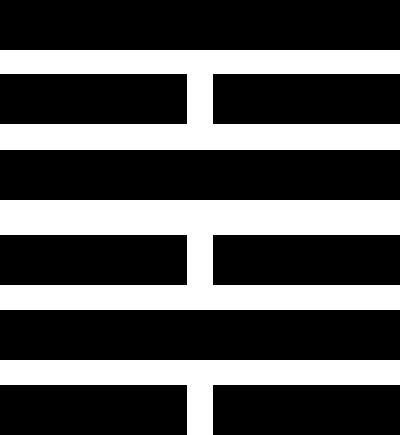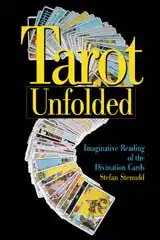
Upper trigram: Li The Clinging, Flame
Lower trigram: K'an The Abysmal, Water
The Judgement
Before Completion. Success.
But if the little fox, after nearly completing the crossing,
Gets his tail in the water,
There is nothing that would further.
The Image
Fire over water:
The image of the condition before transition.
Thus the superior man is careful
In the differentiation of things,
So that each finds its place.
The Lines
These texts apply only for the lines that were marked, when the hexagram was cast. Note that the lines are counted from the bottom up.
The bottom line marked means:
He gets his tail in the water.
Humiliating.
The 2nd line marked means:
He brakes his wheels.
Perseverance brings good fortune.
The 3rd line marked means:
Before completion, attack brings misfortune.
It furthers one to cross the great water.
The 4th line marked means:
Perseverance brings good fortune.
Remorse disappears.
Shock, thus to discipline the Devil's Country.
For three years, great realms are awarded.
The 5th line marked means:
Perseverance brings good fortune.
No remorse.
The light of the superior man is true.
Good fortune.
The top line marked means:
There is drinking of wine
In genuine confidence. No blame.
But if one wets his head,
He loses it, in truth.
The interpretations above and comments below are from Richard Wilhelm's version of the I CHING.
Comments on the Hexagram
This hexagram indicates a time when the transition from disorder to order is
not yet completed. The change is indeed prepared for, since all the lines in
the upper trigram are in relation to those in the lower. However, they are not
yet in their places. While the preceding hexagram offers an analogy to
autumn, which forms the transition from summer to winter, this hexagram
presents a parallel to spring, which leads out of winter's stagnation into the
fruitful time of summer. With this hopeful outlook the Book of Changes
come to its close.
The Judgement
The conditions are difficult. The task is great and full of responsibility. It is
nothing less than that of leading the world out of confusion back to order.
But it is a task that promises success, because there is a goal that can unite the
forces now tending in different directions. At first, however, one must move
warily, like an old fox walking over ice. The caution of a fox walking over ice
is proverbial in China. His ears are constantly alert to the cracking of the ice,
as he carefully and circumspectly searches out the safest spots. A young fox
who as yet has not acquired this caution goes ahead boldly, and it may happen
that he falls in and gets his tail wet when he is almost across the water. Then
of course his effort has been all in vain. Accordingly, in times "before
completion," deliberation and caution are the prerequisites of success.
The Image
When fire, which by nature flames upward, is above, and water, which flows
downward, is below, their effects take opposite directions and remain
unrelated. If we wish to achieve an effect, we must first investigate the
nature of the forces in question and ascertain their proper place. If we can
bring these forces to bear in the right place, they will have the desired effect
and completion will be achieved. But in order to handle external forces
properly, we must above all arrive at the correct standpoint ourselves, for
only from this vantage can we work correctly.
The Lines
The bottom line marked
In times of disorder there is a temptation to advance oneself as rapidly as
possible in order to accomplish something tangible. But this enthusiasm
leads only to failure and humiliation if the time for achievement has not yet
arrived. In such time it is wise to spare ourselves the opprobrium of failure
by holding back.
The 2nd line from the bottom marked
Here again the time to act has not yet come. But the patience needed is not
that of idle waiting without thought of the morrow. Kept up indefinitely,
this would not lead to any success. Instead, an individual must develop in
himself the strength that will enable him to go forward. He must have a
vehicle, as it were, to effect the crossing. But he must for the time being use
the brakes. Patience in the highest sense means putting brakes on strength.
Therefore he must not fall asleep and lose sight of the goal. If he remains
strong and steadfast in his resolve, all goes well in the end.
The 3rd line from the bottom marked
The time of transition has arrived, but one lacks the strength to complete the
transition. If one should attempt to force it, disaster would result, because
collapse would then be unavoidable. What is to be done? A new situation
must be created; one must engage the energies of able helpers and in this
fellowship take the decisive step-cross the great water. Then completion will
become possible.
The 4th line from the bottom marked
Now it is the time of struggle. The transition must be completed. We must
make ourselves strong in resolution; this brings good fortune. All
misgivings that might arise in such grave times of struggle must be silenced.
It is a question of a fierce battle to break and to discipline the Devil's
Country, the forces of decadence. But the struggle also has its reward. Now is
the time to lay the foundations of power and mastery for the future.
The 5th line from the bottom marked
The victory has been won. The power of steadfastness has not been routed.
Everything has gone well. All misgivings have been overcome. Success has
justified the deed. The light of a superior personality shines forth anew and
makes its influence felt among men who have faith in it and rally around it.
The new time has arrived, and with it good fortune. And just as the sun
shines forth in redoubled beauty after rain, or as a forest grows more freshly
green from charred ruins after a fire, so the new era appears all the more
glorious by contrast with the misery of the old.
The top line marked
Before completion, at the dawning of the new time, friends foregather in an
atmosphere of mutual trust, and the time of waiting is passed in conviviality.
Since the new era is hard on the threshold, there is no blame in this. But one
must be careful in all this to keep within proper bounds. If in his exuberance
a man gets drunk, he forfeits the favorableness of the situation through his
intemperance.
Further Reading
Here I add some perspectives on this hexagram, as well as other methods to read its meaning, in additon to what Richard Wilhelm derives from it above.
Meaning of the Trigrams Combined
Each hexagram combines two trigrams, making one the upper and the other the lower. The meaning of the hexagram is mainly derived from that combination. Here's what it means for this hexagram:
Flame upon Water
Notice that this is the very last of the 64 I Ching hexagrams. The book ends "before completion" in a state that seems to be quite momentary: a flame dancing on the surface of the water. So, is the moment of completion when the flame is inevitably extinguished by the water?
But the water is the abyss of almost every creation myth, the dark chaos from which the world emerged. And the flame is the primordial spark, the light that brought day out of eternal night and thereby set the scene for all that was to follow. The last hexagram indicates a Big Bang of sorts, the very moment when a new world is to be born out of the ashes of the old one.
So, the hexagram indicates the end of one thing and the birth of another to take its place. It shows the cyclic nature of the universe and everything in it.
This is a moment of utterly delicate balance. If the flame should dip into the water, like the fox getting its tail wet, then nothing happens. All grand plans are forfeited. But if the flame grows, then suddenly everything happens at once, and nothing is the same anymore. What will be the outcome — and exactly when — is difficult to predict. One can just wait.
That's how to understand the hexagram when it appears in a reading. This is the moment when either everything or nothing happens. There is nothing more to do about it. Now, it's up to chance alone. In other words: wait and see. Marked lines may suggest the outcome, but don't bet on it. The difference between everything and nothing remains a mystery.
Yin and Yang Significances
The hexagram has an equal number of Yin (broken) and Yang (full) lines, arranged in pairs. The basic forces of the world are in balance, although not by trigram but for the hexagram as a whole. And in each pair the Yang (heaven) line is above the Yin (earth) one, which is as it should be. So, this balance is stable. The lines make a complete and orderly whole, and there is power to it, akin to that of electricity where plus and minus interact — but here the switch is not turned on. The potency of this hexagram is at rest, as if waiting.
Read more about the polarity of Yin and Yang here:
Yin and Yang
Compare to the Reversed Trigrams
It's common to compare a hexagram to the one where the lines are the opposite: a full line is broken and a broken line full. But I find it much more interesting to compare hexagrams with the trigrams reversed: the upper trigram becomes the lower, and the lower trigram becomes the upper. That deepens the understanding of the trigrams at work — when they're not identical. Click the image to see what it means for the two trigrams of this hexagram:

The hexagram with the trigrams reversed
Compare to the Reversed Lines
You can also compare this hexagram to its opposite according to the six lines, where each broken line is full, and vice versa. In some cases it leads to the same hexagram as the one where the trigrams are switched. Here is the hexagram with reversed lines (click it to get to its webpage):

Hexagram with opposite lines
Click the header to read more about the eight trigrams that are combined into the 64 hexagrams.
The 64 I Ching Hexagrams
An I Ching hexagram is composed of two trigrams. Each of the 64 hexagrams has its own name, meaning, and divinatory text. Here they all are, in the traditional order. Click on the image of an I Ching hexagram to get to its webpage.
Use the Facebook field on some of these web pages to comment the I Ching or this website.






































































